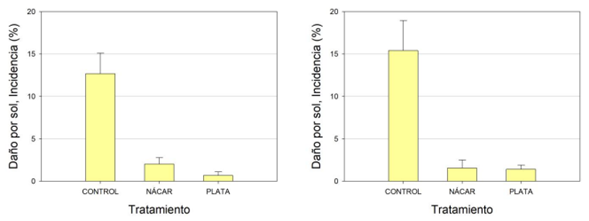Agricolor AGS the new solution against sun damage in apple trees

By Agralia
Apples are one of the most requested fruits by companies all over the world and taking care of them is essential to guarantee the production and harvest of the year.
Sun damage on apples has become the main cause of fruit discarding at the orchard level and in the export process, associated with the following factors:
- New high-value varieties on the market that are sensitive to sun damage.
- Long cycle and late harvest varieties where the fruit exposed on the crown receives intense solar radiation for about four months.
- Stressful climatic conditions, due to high temperatures (>30°C) and low relative humidity (<40%) in summer when the fruit is developing.
- Climate change and the depletion of the ozone layer.
- Demands of higher fruit quality in buyer markets.
The Spanish company Agralia is a pioneer in research, innovation, development and supply of differentiated products according to the needs of each region of the world, improving efficiency to obtain greater profitability.
"Our mission is to offer efficient solutions with the highest quality. We achieve this with continuous support and advice to our clients, with solutions that adapt to your real needs," the company said.
The Agralia Research Development and Innovation team has created what is called Agricolor AGS. It is a fabric with an anti-hail and anti-sun damage effect, that uses different technologies for the various causes of damage caused by micro-climatic conditions and improves the apple quality without neglecting the physiological needs of the tree.
Designs and options
The Agricolor group offers different designs, according to the climatic conditions of each field's geographical location.
- Agricolor Sheer: A fabric designed with threads that have a very high light diffusion capacity, ideal for areas where sun damage is caused by direct radiation. Agricolor AGD Sheer improves the coloring of the fruit, as the diffusion of light helps to illuminate areas of the tree that would normally be under shade.
- Agricolor Sheer Silver: A specific fabric for areas with very high radiation and is made up of two types of thread. The first is a thread with the ability to diffuse light to avoid direct radiation and to improve the coloring of the fruit, but it also has threads with aluminum microparticles. These amorphous and sometimes spherical microparticles block infrared radiation on the apples, which would create sunburn. Additionally, they transform direct light into diffuse light, increasing net photosynthesis by scattering it in all directions of the tree and fruit.
- Agricolor Blue Silver: Unlike the other fabrics, in addition to the effect of the aluminum microparticles, this fabric adds color, considering that the different colors modify the development of the trees. The blue color generally slows down the vegetative development of trees, ideal for areas where protection is sought for the seasonality of the harvest and potentially to delay it for better sale prices.
In a test carried out by the Pomáceas Center of the University of Talca in Chile, Agricolor Sheer and Sheer Silver were evaluated for damage from sunstroke, where the following results were observed:
According to the company, in the Fuji variety, the control showed damage in 13 percent of fruits. Using Agricolor Sheer it was reduced to two percent of and only one percent in Agricolor Sheer Silver. In the Cripps Pink variety, damage in the control group reached 15 percent. Using the Sheer and Sheer Silver meshes, damages reached 1.6 and 1.4 percent, respectively.
Figure 1. Incidence of sun damage in Fuji (left) and Cripps Pink (right), of trees grown outdoors (Contol) and under mesh (Agricolor Sheer and Sheer Silver)
To establish the level of damage in the affected fruits, they were separated according to the categories Mild, Moderate and Severe (Figure 2). In the Control fruits, the number of apples in the Mild category was slightly different between cultivars, with 11.3 and 12.6 percent for Fuji and Cripps Pink, respectively. Cripps Pink, showed two percent of its fruit that grew outdoors with severe damage, unlike Fuji, with only 0.2 percent.
Figure 2. Severity (Slight, Moderate and Severe) of sun damage in Fuji (left) and Cripps Pink (right), in trees grown outdoors (Control) and under mesh (Agricolor Sheer and Sheer Silver).
The use of mesh did not produce a reduction in color development. Under these meshes, the reddest fruits were obtained in terms of the intensity of the pigmentation.
Figure 3. Averages of coverage (left) and intensity (right) of Fuji apples from trees grown outdoors (Control) and under mesh (Agricolor Sheer and Sheer Silver).
Regarding the size of the fruit, the company said that the trend is that the apples, both Fuji and Cripps Pink, from the Control trees were smaller (Figure 4). The Cripps Pink fruits showed greater variation, especially those produced under both meshes.
Figure 4. Average weight (g) of Fuji (left) and Cripps Pink (right) apples, of trees grown outdoors (Control) and under mesh (Agricolor Sheer and Sheer Silver).
In short, Agricolor AGS is a group of fabrics designed for different situations and goals of producers. Agralia's team of agronomists provides the necessary agrotechnical support to analyze and decide the type of protection needed to ensure the best quality and profitability of production.
For more information, reach out to AGRALIA ESPAÑA at +34 935 113 167 or by email at info@agraliagroup.com and AGRALIA CHILE at +56 984 507 174 or by email at infochile@agraliagroup.com.
Visit our webpage at http://agraliagroup.com/.
















































